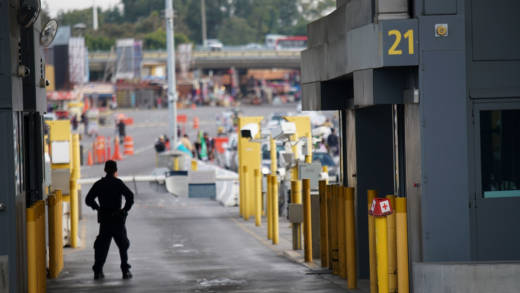"They, they got to go to INM and register first," the agent says on the tape. "They can't come in here. Once they go to INM, we get them from INM."
One of the advocates objects, saying the Honduran family already checked with Mexican authorities, who said they could do nothing for them.
And, he adds "I've read the law and there's zero parts of the law that states that an asylum seeker from Honduras has to go talk to a Mexican immigration official to be able to request asylum in the United States. Are you denying them the ability to request asylum in the United States?"
Another border agent insists the family contact Mexican authorities. She says U.S. officials are understaffed and overwhelmed by the number of asylum seekers. So they established an arrangement with Mexico to regulate the flow.
Then, after talking to another supervisor, she relents.
"We're going to process them," she says. "How about that? All right?"
Human Rights First said it did not participate in the making of the recording but released it publicly and posted it on YouTube. The group said it had worked with the volunteers before. It did not release their names, or the names of the family members and border agents.
There are a few gaps in the 20-minute recording, representing time the volunteers said they were waiting to talk with various border agents.
"Such advocacy should not be required," says Shaw Drake, a lawyer working for Human Rights First. He said the Honduran family likely would have been turned away — like so many others — if the volunteers hadn't been there to advocate for them.
"It is not practical to assume that every asylum seeker approaching the border that are in need of immediate protection would have such advocates there to assist them," he said.
Carlos Diaz, a spokesman for Customs and Border Protection, declined to comment on the audio recording. But he said that the agency "enforces the law humanely, respectfully and with professionalism."
The exchange at the port of entry highlights what human rights activists contend is a pattern of American officials making it more difficult for asylum seekers.
Activists say U.S. border agents are telling asylum seekers that they'll need a visa before they can apply. Or that they'll be separated from their children. Or, more recently, that Donald Trump has eliminated asylum.
"These things are simply untrue," says Melissa Crow, legal director at the D.C.-based American Immigration Council. Her group and others have filed a class-action lawsuit against the Department of Homeland Security, challenging those alleged practices.
"All of these tactics serve to deny bona fide asylum seekers the opportunity to pursue their claims," she says.
Diaz, from Customs and Border Protection, declined to comment on the litigation. He said that the agency "has not changed any policies affecting asylum procedures."
Anyone seeking asylum in the U.S. must be granted an interview to determine if they have a credible fear of returning home. The Trump administration has imposed stricter controls on that process. Citing rampant fraud, Trump has instructed Homeland Security to tighten that screening process for anyone seeking asylum.
Copyright 2017 NPR. To see more, visit http://www.npr.org/.
9(MDAxOTAwOTE4MDEyMTkxMDAzNjczZDljZA004))

9(MDAxOTAwOTE4MDEyMTkxMDAzNjczZDljZA004))
